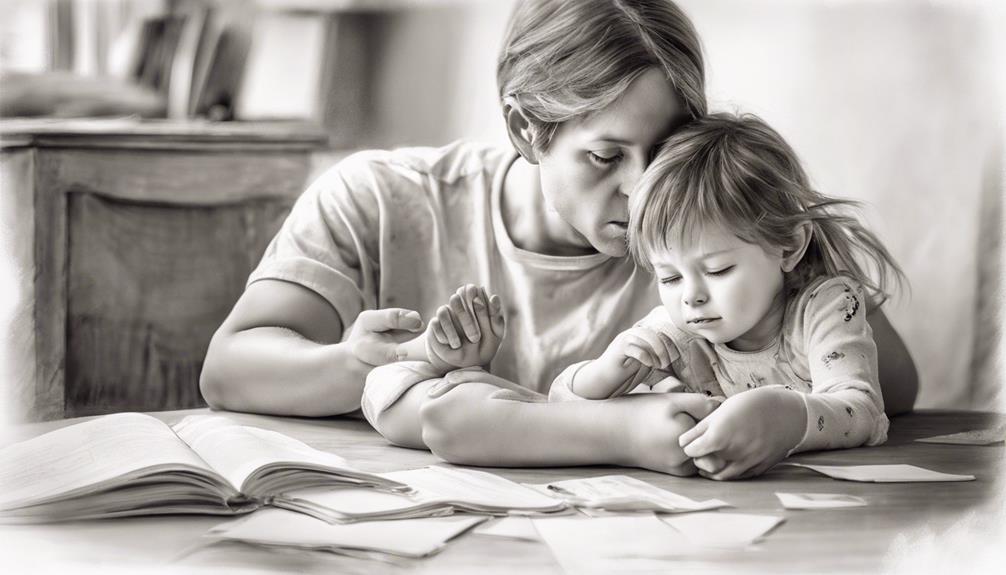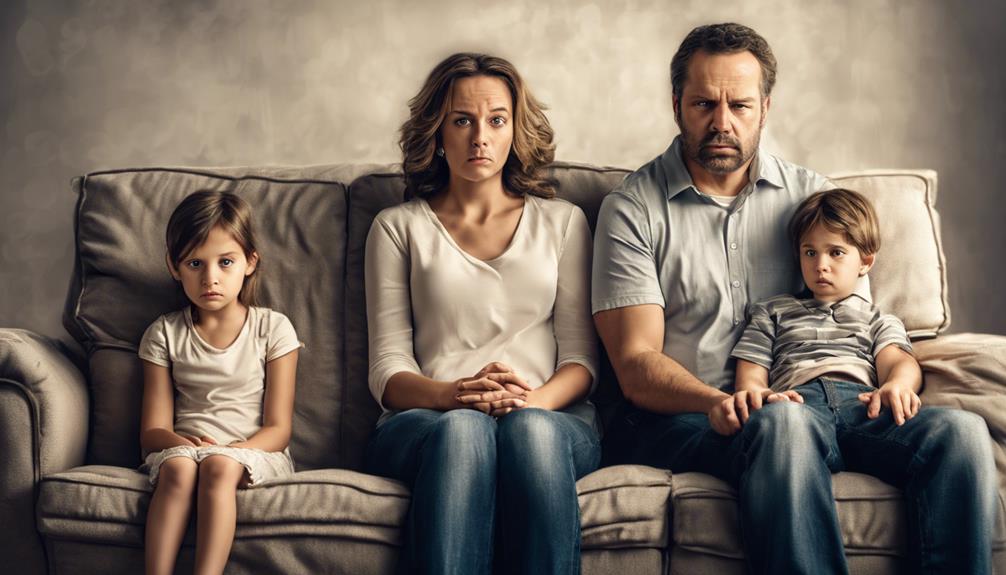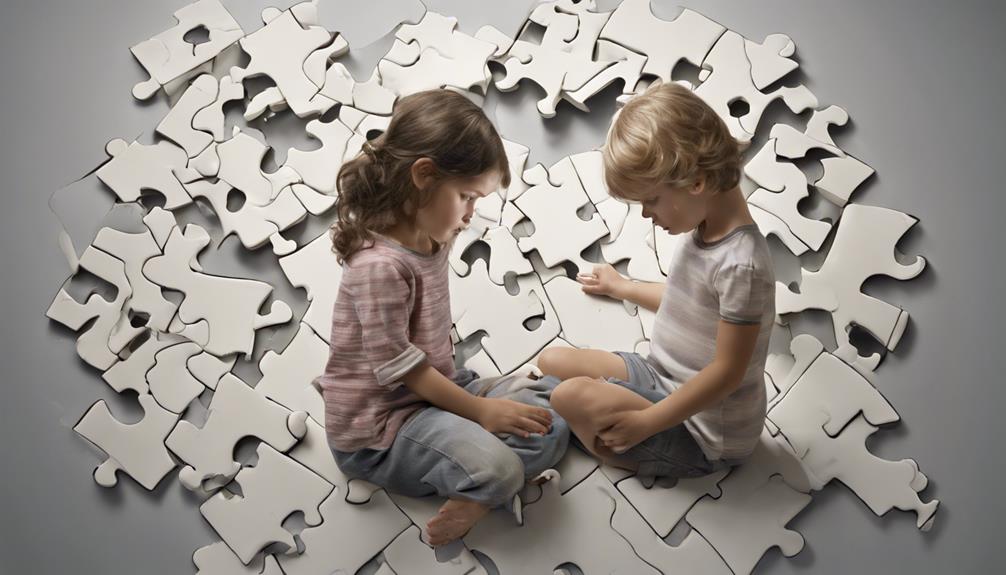When telling kids about divorce, plan with care and use fitting language. Create a safe area for questions and explain gently. Stay united with the other parent, keep routines consistent, and be ready for co-parenting talks. Use simplified language, connect to their world, and answer their queries. Encourage open talks, offer emotional support, and reassure them of your love. It's essential to give them time to process and express their feelings. Effective communication, co-parenting, and support provide a solid foundation for these discussions.
Key Takeaways
- Plan the conversation thoughtfully and use age-appropriate language.
- Maintain a united front with the co-parent to provide consistency.
- Encourage open dialogue, address concerns, and provide emotional support.
- Reassure children of their innocence and remind them that the divorce isn't their fault.
- Seek professional help if needed and create a safe space for children to ask questions.
Preparation and Planning
When preparing to discuss divorce with children, it's important to plan the conversation carefully with your partner to guarantee a unified and supportive message is delivered. This unified front helps provide stability and reassurance to the children during this challenging time.
Using simple, age-appropriate language is vital to make sure that children understand the situation without feeling overwhelmed. Creating a safe and comfortable space for the children to ask questions will help them process their emotions and concerns.
Explaining forthcoming changes gently and focusing on what'll remain consistent can provide a sense of security amidst the uncertainty. If managing the conversation proves to be challenging, seeking professional help is advisable to guarantee that the children's emotional well-being is prioritized.
United Front With Co-Parent

To ensure a smooth and supportive approach towards discussing divorce with children, maintaining a united front with the co-parent is crucial. Coordinating with your co-parent post-divorce can lead to better child-related decisions and consistency in household rules.
Establishing consistent household routines with your co-parent provides stability for your kids during the divorce process. Mental and emotional preparation for co-parenting discussions helps in maneuvering challenges post-divorce.
Seeking support from family, friends, or professionals aids in effective co-parenting strategies and emotional well-being. Joining a divorce support group or consulting with a therapist offers valuable guidance and assistance in co-parenting dynamics.
Age-Appropriate Communication

How can parents effectively tailor their communication about divorce to their child's age and maturity level? When discussing divorce with children, it's important to take into account their developmental stage and understanding. Here are some ways to guarantee age-appropriate communication:
- Simplify Language: Use clear, straightforward language that's easy for your child to comprehend. Avoid complex terms or overwhelming details that may confuse them.
- Relate to Their World: Connect the concept of divorce to familiar aspects of your child's life, such as changes in routine or relationships. This can help them better grasp the situation.
- Consider Processing Capacity: Think about what your child can process at once without feeling overwhelmed or confused. Tailor the amount of information you provide to their cognitive abilities.
- Address Questions and Concerns: Be prepared to answer any questions or concerns your child may have. Encourage an open dialogue to help them express their thoughts and feelings about the divorce.
Encouraging Open Dialogue

Connect the divorce discussion to your child's daily experiences and emotions to foster open dialogue and understanding. Encourage kids to ask questions and express their feelings openly.
Validate their emotions, letting them know it's okay to feel sad, confused, or angry. Create a safe space for dialogue where children feel heard and supported.
Use age-appropriate language to facilitate communication and understanding. Reassure kids that their feelings are valid and that they aren't alone in the process.
By encouraging open dialogue, you help your child navigate the complexities of divorce with better understanding and emotional support. Remember to be patient and attentive, allowing your child to express themselves freely.
This open communication can strengthen your bond with your child during this challenging time and help them cope more effectively with the changes happening in their family dynamic.
Providing Reassurance and Support

Assuring children that the divorce isn't their fault is essential in providing them with emotional support and stability during this challenging period. It's important to reinforce the following points to help children navigate the complexities of divorce:
- Reassure kids of their innocence: Children often blame themselves for their parents' divorce. It's imperative to remind them that the decision isn't their fault.
- Provide consistent love and support: Emphasize to children that they're valued and important to both parents. Consistent love and support can help reassure them during this phase.
- Maintain stability through parental involvement: Highlight that both parents will remain involved in their lives post-divorce to provide a sense of stability and security.
- Encourage open communication: Create a safe space for children to express their feelings openly. Encouraging communication about emotions can help them process the changes and feel supported.
Allowing Time for Processing and Expression

Children processing a divorce announcement need time to navigate their emotions.
Encouraging open communication allows them to express their thoughts and feelings.
Providing vital emotional support is essential as kids adjust to this new reality.
Acknowledging Childrens Feelings
Upon learning about their parents' divorce, it's important to create a supportive environment where children can process and express their emotions freely.
It's vital to acknowledge and validate children's feelings of confusion, sadness, or anger after hearing about the divorce. Allow kids time to process their emotions and provide a safe space for them to express their thoughts and concerns openly.
Reassure children that it's normal to feel a range of emotions and encourage them to share their feelings without judgment. Validate the validity of their emotions and emphasize that it's okay to feel upset or uncertain.
Support kids in understanding and coping with their emotions by actively listening and offering comfort and reassurance.
Encouraging Open Communication
After acknowledging children's feelings surrounding their parents' divorce, it's important to foster an environment that encourages open communication, allowing children the time they need to process and express their emotions freely.
Encourage children to ask questions and express their feelings openly. Provide a safe space for children to process the news at their own pace. Validate their emotions and let them know it's okay to feel upset or confused. Reassure them that their feelings are important and will be supported. Remember to allow time for children to adjust to the news and be patient with their reactions.
Providing Emotional Support
Allowing children ample time to process the news of their parents' divorce is essential in providing the emotional support they need during this challenging period. To support children effectively, consider the following:
- Give them space to process and express their emotions naturally.
- Encourage open communication about their feelings and concerns.
- Validate their emotions and reassure them that it's normal to feel a range of emotions.
- Be patient with their reactions, offering ongoing support as they navigate this difficult time.
Frequently Asked Questions
How Do You Tell Kids You Are Getting a Divorce?
When parents decide to divorce, they should explain the situation honestly and gently to their kids. Creating a safe and comfortable environment, using simple language, and reassuring ongoing love and support are key components in breaking the news.
At What Age Is a Child Most Affected by Divorce?
Children between the ages of 6 and 12 are often most affected by divorce due to their cognitive development and understanding of family dynamics. Research suggests that around 8 or 9 years old, kids may experience heightened emotional reactions to divorce.
What Not to Tell Your Kids About Divorce?
Parents should avoid sharing intimate marital conflicts, blaming each other, involving kids in adult decisions, using children as messengers, or speaking negatively about the other parent. Protecting kids from these aspects is vital during a divorce.
How Do You Tell Your Kids You're Seeing Someone After Divorce?
Ease into revealing a new romantic partner post-divorce by gradually introducing them in a neutral setting. Encourage open dialogue with kids to address concerns, reaffirming your unwavering love for them. Be patient as they adjust.
Conclusion
To sum up, breaking the news of divorce to kids requires careful planning and communication. By working together with the co-parent, using age-appropriate language, and being supportive, parents can help children navigate this difficult time.
Remember, just like a ship sailing through stormy waters, families can weather the challenges of divorce by staying united and providing love and reassurance to their children.
So, be honest, be patient, and be there for your kids every step of the way.










